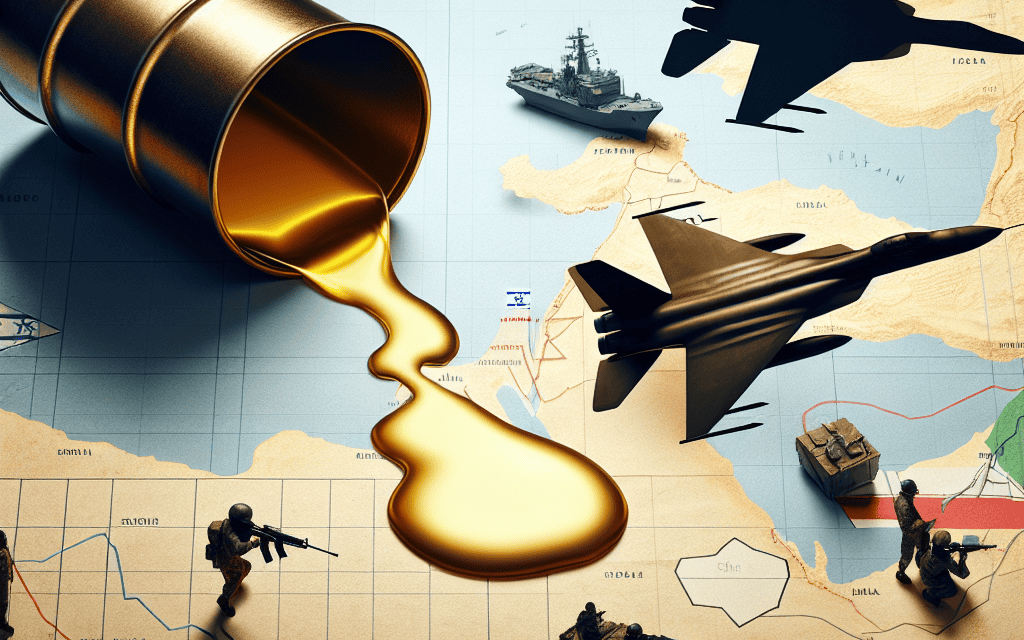“Market Relief: Oil Prices Tumble Amid Israel’s Precision Strikes on Iran’s Military.”
Introduction
Oil prices have experienced a notable decline as geopolitical tensions in the Middle East intensify, with Israel concentrating its military efforts on Iranian targets. This strategic focus has shifted market dynamics, influencing global oil supply perceptions and investor sentiment. The situation underscores the complex interplay between regional conflicts and energy markets, as stakeholders closely monitor developments that could impact oil production and distribution channels. The drop in prices reflects both immediate market reactions and broader concerns about potential disruptions in a region critical to global energy supplies.
Impact Of Geopolitical Tensions On Global Oil Markets
The global oil markets have always been sensitive to geopolitical tensions, and recent developments in the Middle East have once again underscored this reality. The latest news of Israel focusing its military strikes on Iranian targets has led to a notable drop in oil prices, a reaction that reflects the complex interplay between regional conflicts and global economic stability. As Israel intensifies its military operations against Iran, targeting specific military installations, the immediate impact on oil prices has been somewhat counterintuitive. Typically, heightened tensions in the Middle East, a region that is home to a significant portion of the world’s oil reserves, would lead to fears of supply disruptions, thereby driving prices up. However, the current situation presents a different narrative.
One of the primary reasons for the decline in oil prices is the market’s perception of the targeted nature of Israel’s strikes. By focusing on military targets rather than broader infrastructure, the immediate threat to oil production and transportation routes appears limited. This has provided a degree of reassurance to traders and investors, who are now less concerned about a sudden and severe disruption in oil supplies. Furthermore, the global oil market is currently experiencing a period of relative oversupply, with major producers like the United States, Russia, and Saudi Arabia maintaining high levels of output. This surplus has created a buffer that can absorb potential shocks, reducing the likelihood of significant price spikes.
In addition to these factors, the international community’s response to the escalating tensions has also played a role in stabilizing oil prices. Diplomatic efforts, particularly from key players such as the United States and European Union, have been aimed at de-escalating the situation and preventing a broader conflict. These efforts have been somewhat successful in calming market fears, as evidenced by the recent price trends. Moreover, the global economy is currently navigating a complex landscape marked by inflationary pressures and concerns over economic growth. In this context, lower oil prices can be seen as a welcome development, potentially easing inflation and providing some relief to consumers and businesses alike.
However, it is important to recognize that the situation remains fluid, and the potential for further volatility in oil markets cannot be discounted. Any escalation in hostilities or a shift in the focus of military operations could quickly alter the current dynamics, leading to renewed concerns over supply disruptions. Additionally, the broader geopolitical landscape, including ongoing tensions between major powers and regional rivalries, continues to pose risks to market stability. In conclusion, while the immediate impact of Israel’s military focus on Iranian targets has led to a drop in oil prices, the underlying geopolitical tensions remain a significant factor influencing global oil markets. The targeted nature of the strikes, combined with current market conditions and diplomatic efforts, has provided a temporary reprieve from price volatility. However, the potential for further developments necessitates continued vigilance and adaptability from market participants. As the situation evolves, the interplay between geopolitical events and economic factors will undoubtedly continue to shape the trajectory of oil prices, underscoring the intricate connections between regional conflicts and global economic stability.
Israel-Iran Conflict: Implications For Energy Security
The recent developments in the Israel-Iran conflict have captured global attention, particularly due to their potential implications for energy security. As Israel intensifies its focus on military targets within Iran, oil prices have experienced a notable decline. This shift in the energy market is a direct consequence of the geopolitical tensions that have long been a source of volatility in oil prices. Understanding the dynamics at play requires a closer examination of the factors influencing this complex situation.
To begin with, the Israel-Iran conflict has been a persistent source of instability in the Middle East, a region that holds a significant portion of the world’s oil reserves. Historically, any escalation in tensions between these two nations has led to concerns over potential disruptions in oil supply, thereby driving prices upward. However, the current scenario presents a different picture. Israel’s strategic focus on military targets within Iran, rather than broader infrastructure or economic assets, has somewhat alleviated fears of widespread disruption in oil production or transportation. This targeted approach has contributed to a sense of cautious optimism among market participants, leading to a decrease in oil prices.
Moreover, the global oil market is influenced by a myriad of factors beyond geopolitical tensions. In recent months, there has been a concerted effort by major oil-producing nations to stabilize prices through coordinated production adjustments. The Organization of the Petroleum Exporting Countries (OPEC) and its allies have been actively managing output levels to balance supply and demand. This proactive stance has provided a buffer against potential price spikes resulting from regional conflicts. Consequently, the impact of the Israel-Iran conflict on oil prices has been somewhat mitigated by these broader market dynamics.
In addition to these factors, advancements in energy technology and diversification of energy sources have played a crucial role in shaping the current landscape. The global push towards renewable energy and increased energy efficiency has reduced the world’s reliance on oil as the primary energy source. This transition has lessened the immediate impact of geopolitical tensions on oil prices, as alternative energy sources provide a degree of insulation against supply disruptions. As a result, the market’s reaction to the Israel-Iran conflict has been more measured compared to previous instances of regional instability.
Furthermore, the role of strategic oil reserves cannot be overlooked in this context. Many countries maintain reserves to cushion against sudden supply shocks, providing an additional layer of security. The existence of these reserves has contributed to a more stable outlook for oil prices, even amidst geopolitical tensions. Governments can release these reserves to stabilize markets, thereby preventing panic-driven price surges.
In conclusion, while the Israel-Iran conflict remains a significant geopolitical issue with potential implications for energy security, the current focus on military targets has led to a decline in oil prices. This development is influenced by a combination of factors, including strategic military targeting, coordinated efforts by oil-producing nations, advancements in energy technology, and the presence of strategic reserves. As the situation continues to evolve, it is essential for stakeholders to remain vigilant and adaptable to the changing dynamics of the global energy market. The interplay between geopolitical tensions and energy security will undoubtedly continue to shape the future of oil prices and the broader energy landscape.
Oil Price Volatility Amid Middle East Conflicts
The recent decline in oil prices has captured the attention of global markets, as geopolitical tensions in the Middle East continue to influence economic dynamics. The focus of Israel’s military strategy on Iran’s military targets has played a significant role in this development, leading to a complex interplay of factors that have contributed to the volatility of oil prices. As Israel intensifies its efforts to neutralize perceived threats from Iran, the global oil market is responding with a mixture of apprehension and relief.
To understand the current situation, it is essential to consider the broader context of Middle Eastern geopolitics. Historically, the region has been a focal point for oil production and exportation, with any conflict or instability having the potential to disrupt supply chains and influence global oil prices. However, the recent strategic focus by Israel on Iran’s military infrastructure, rather than broader economic or civilian targets, has somewhat alleviated fears of a widespread disruption in oil supply. This targeted approach has been perceived as a move to contain the conflict within specific parameters, thereby reducing the risk of a broader regional escalation that could impact oil production facilities.
Moreover, the global oil market has been closely monitoring the situation, with traders and analysts assessing the potential implications of Israel’s military actions. The initial reaction to the heightened tensions was a spike in oil prices, driven by concerns over potential supply disruptions. However, as it became apparent that the military focus was limited to specific targets, the market began to stabilize, leading to a subsequent drop in prices. This decline reflects a cautious optimism that the conflict may not escalate to a level that would significantly impact oil production or transportation routes.
In addition to the geopolitical factors, other elements have also contributed to the current volatility in oil prices. The global economic landscape, characterized by fluctuating demand and supply dynamics, has played a crucial role. The ongoing recovery from the COVID-19 pandemic has led to varying levels of demand across different regions, with some economies experiencing robust growth while others face challenges. This uneven recovery has added another layer of complexity to the oil market, influencing price movements alongside geopolitical developments.
Furthermore, the role of major oil-producing nations and organizations, such as OPEC, cannot be overlooked. These entities have been actively managing production levels to stabilize the market, responding to both short-term fluctuations and long-term trends. Their decisions, in conjunction with geopolitical events, have a profound impact on oil prices, as they strive to balance supply and demand in an ever-changing environment.
In conclusion, the recent drop in oil prices amid Israel’s focus on Iran’s military targets highlights the intricate relationship between geopolitical tensions and global economic factors. While the targeted nature of Israel’s military actions has provided some reassurance to the market, the situation remains fluid, with potential for further developments that could influence oil prices. As the world continues to navigate these complexities, the interplay between geopolitical events and economic dynamics will remain a critical factor in shaping the future of the global oil market.
Strategic Military Strikes And Their Effect On Oil Supply Chains

The recent decline in oil prices has captured the attention of global markets, as Israel’s strategic military strikes on Iran have been carefully focused on military targets, thereby minimizing disruptions to oil supply chains. This development comes at a time when geopolitical tensions in the Middle East often lead to volatility in oil markets, given the region’s significant contribution to global oil production. However, the current situation presents a unique case where military actions have not translated into the expected spikes in oil prices, largely due to the precision and intent behind Israel’s operations.
To understand the dynamics at play, it is essential to consider the strategic nature of Israel’s military strikes. By concentrating efforts on military installations and avoiding infrastructure critical to oil production and transportation, Israel has managed to mitigate the potential for widespread disruption. This approach reflects a calculated effort to address security concerns while maintaining stability in global oil markets. Consequently, the targeted nature of these strikes has reassured investors and market participants, leading to a decrease in speculative trading that often drives oil prices upward during periods of conflict.
Moreover, the international community’s response has played a crucial role in maintaining market stability. Diplomatic efforts have been intensified to prevent an escalation of hostilities, with key stakeholders emphasizing the importance of safeguarding energy supplies. This collaborative approach has fostered a sense of confidence among oil-importing nations, further contributing to the stabilization of prices. Additionally, the presence of strategic oil reserves in various countries provides a buffer against potential supply disruptions, offering an additional layer of security to the global oil market.
In parallel, advancements in technology and diversification of energy sources have also contributed to the resilience of oil supply chains. The increasing adoption of renewable energy and improvements in energy efficiency have reduced the world’s reliance on oil, thereby lessening the impact of regional conflicts on global energy markets. This shift towards a more diversified energy portfolio has provided countries with greater flexibility in managing their energy needs, reducing the immediate pressure on oil prices in times of geopolitical tension.
Furthermore, the role of major oil-producing nations cannot be overlooked. Countries such as Saudi Arabia and the United Arab Emirates have reiterated their commitment to ensuring a stable supply of oil, even amidst regional conflicts. Their ability to ramp up production and adjust output levels in response to market conditions has been instrumental in maintaining a balance between supply and demand. This proactive stance by key oil producers has been a stabilizing force, preventing drastic fluctuations in oil prices.
In conclusion, the recent drop in oil prices, despite Israel’s military strikes on Iran, underscores the effectiveness of strategic targeting and international cooperation in maintaining stability in global oil markets. By focusing on military objectives and avoiding critical oil infrastructure, Israel has minimized the potential for supply chain disruptions. Coupled with diplomatic efforts, technological advancements, and the commitment of major oil producers, these factors have collectively contributed to a more resilient and stable oil market. As the situation continues to evolve, the interplay between military strategy and market dynamics will remain a critical area of focus for policymakers and industry stakeholders alike.
Analyzing The Economic Consequences Of Oil Price Fluctuations
The recent decline in oil prices, prompted by Israel’s strategic focus on military targets in Iran, has sparked a complex web of economic consequences that reverberate across global markets. As geopolitical tensions in the Middle East often lead to fluctuations in oil prices, the current situation is no exception. However, the targeted nature of Israel’s actions has introduced a nuanced dynamic, influencing both short-term market reactions and long-term economic implications.
Initially, the drop in oil prices can be attributed to the market’s perception of reduced risk to oil supply routes. Historically, conflicts in the Middle East have raised concerns about potential disruptions in oil production and transportation, leading to price spikes. In this instance, Israel’s precision in targeting military installations rather than broader infrastructure has alleviated some of these fears. Consequently, traders and investors have responded by adjusting their risk assessments, resulting in a downward pressure on oil prices.
Moreover, the decline in oil prices has provided a temporary reprieve for oil-importing nations, which stand to benefit from reduced energy costs. Lower oil prices can lead to decreased transportation and manufacturing expenses, potentially stimulating economic activity and consumer spending. For countries heavily reliant on oil imports, this development offers an opportunity to bolster economic growth and improve trade balances. However, it is essential to recognize that these benefits may be short-lived if geopolitical tensions escalate or if other factors, such as production cuts by major oil-producing nations, come into play.
Conversely, oil-exporting countries face a different set of challenges. For these nations, the drop in oil prices translates into reduced revenue from oil exports, which can strain national budgets and impact public spending. Many oil-dependent economies rely heavily on oil revenues to fund social programs and infrastructure projects. A sustained period of low oil prices could necessitate budgetary adjustments, potentially leading to economic instability and social unrest. Thus, while some countries may experience temporary gains, others must grapple with the adverse effects of diminished oil income.
In addition to national economies, the oil price fluctuation has implications for global financial markets. Energy stocks, which are closely tied to oil prices, have experienced volatility as investors react to the changing landscape. A decline in oil prices can lead to decreased profitability for energy companies, affecting their stock valuations and, by extension, the broader market indices. Furthermore, the interconnectedness of global markets means that shifts in oil prices can influence currency exchange rates, inflation expectations, and monetary policy decisions.
As the situation unfolds, it is crucial for policymakers and market participants to remain vigilant and adaptable. The interplay between geopolitical developments and economic outcomes underscores the importance of strategic planning and risk management. While the immediate impact of Israel’s actions has led to a decrease in oil prices, the long-term consequences remain uncertain. Factors such as potential retaliatory measures, shifts in alliances, and changes in production strategies by major oil producers could alter the current trajectory.
In conclusion, the recent drop in oil prices, driven by Israel’s targeted military actions in Iran, presents a multifaceted economic scenario. While some nations may benefit from lower energy costs, others face challenges related to reduced oil revenues. The broader implications for global financial markets further complicate the picture, highlighting the need for careful analysis and strategic foresight. As the situation continues to evolve, stakeholders must navigate the intricate balance between geopolitical developments and economic stability.
The Role Of OPEC In Stabilizing Oil Prices During Crises
In recent weeks, the global oil market has witnessed a significant drop in prices, largely attributed to geopolitical developments in the Middle East. As Israel intensifies its focus on military targets in Iran, the potential for widespread conflict has raised concerns about the stability of oil supplies. However, amidst these tensions, the Organization of the Petroleum Exporting Countries (OPEC) has played a crucial role in stabilizing oil prices, demonstrating its enduring influence in the global energy landscape.
OPEC, a consortium of oil-producing nations, has long been a pivotal player in the regulation of oil production and pricing. During times of crisis, such as the current situation involving Israel and Iran, OPEC’s ability to manage production levels becomes particularly significant. By adjusting output, OPEC can mitigate the volatility that often accompanies geopolitical unrest, thereby providing a buffer against sudden price spikes or drops. This capacity to influence market dynamics underscores OPEC’s importance in maintaining a semblance of stability in the oil sector.
In the current scenario, OPEC’s response has been measured and strategic. Recognizing the potential for disruption in oil supplies due to escalating tensions, the organization has opted to maintain production levels that align with global demand. This decision reflects a careful balancing act, as OPEC seeks to prevent an oversupply that could further depress prices while ensuring that any potential shortfall is adequately addressed. By doing so, OPEC not only stabilizes prices but also reassures markets that it remains committed to its role as a stabilizing force.
Moreover, OPEC’s actions are complemented by its ongoing dialogue with non-member oil-producing countries, particularly those involved in the OPEC+ alliance. This collaboration extends the organization’s influence and enhances its ability to respond effectively to crises. Through coordinated efforts, OPEC+ can implement production adjustments that reflect a broader consensus, thereby amplifying the impact of its decisions on global oil markets. This cooperative approach is instrumental in fostering a more resilient and adaptable oil market, capable of weathering geopolitical storms.
In addition to production management, OPEC’s role in stabilizing oil prices is also evident in its efforts to promote transparency and communication within the industry. By providing regular updates on production levels, market forecasts, and strategic initiatives, OPEC helps to reduce uncertainty and speculation, which are often catalysts for price volatility. This commitment to openness not only enhances market confidence but also facilitates informed decision-making among stakeholders, from governments to investors.
While OPEC’s influence is undeniable, it is important to acknowledge the complex interplay of factors that contribute to oil price stability. Geopolitical developments, technological advancements, and shifts in consumer behavior all play a role in shaping the market landscape. Nevertheless, OPEC’s proactive measures during crises, such as the current tensions between Israel and Iran, highlight its capacity to navigate these complexities and uphold its mandate of ensuring a stable and secure oil supply.
In conclusion, as oil prices fluctuate in response to geopolitical events, OPEC’s role in stabilizing the market remains indispensable. Through strategic production management, collaboration with non-member countries, and a commitment to transparency, OPEC continues to exert a stabilizing influence on global oil prices. As the situation in the Middle East unfolds, the organization’s actions will undoubtedly be closely monitored, serving as a testament to its enduring relevance in the ever-evolving energy sector.
Future Outlook: Energy Markets In A Geopolitically Unstable World
The recent decline in oil prices, following Israel’s strategic focus on military targets in Iran, has introduced a new layer of complexity to the already volatile energy markets. This development underscores the intricate relationship between geopolitical tensions and global energy dynamics. As Israel intensifies its military operations, targeting specific Iranian military installations, the immediate impact on oil prices has been a downward trend. This is largely attributed to the market’s perception that the conflict, while significant, is currently contained to military objectives, thereby reducing the immediate threat to oil supply routes and infrastructure.
In the broader context, the energy markets are no strangers to the influence of geopolitical instability. Historically, tensions in the Middle East have often led to fluctuations in oil prices, driven by fears of supply disruptions. However, the current situation presents a nuanced scenario. The targeted nature of Israel’s military actions suggests a strategic approach aimed at minimizing collateral damage and avoiding escalation into a full-blown regional conflict. Consequently, this has somewhat alleviated market fears of a major disruption in oil supplies, leading to the observed decrease in prices.
Moreover, the global energy landscape is undergoing a transformation, with increasing diversification of energy sources. The rise of renewable energy and advancements in technology have gradually reduced the world’s reliance on oil, providing a buffer against geopolitical shocks. This shift is evident in the way markets are responding to the current situation, with a more measured reaction compared to past crises. The diversification of energy sources not only enhances energy security but also contributes to stabilizing prices in times of geopolitical uncertainty.
Nevertheless, the future outlook for energy markets remains fraught with challenges. The geopolitical landscape is inherently unpredictable, and the potential for escalation in the Middle East cannot be entirely discounted. Should the conflict between Israel and Iran intensify, the repercussions on global oil supplies could be significant, leading to a sharp increase in prices. Additionally, the involvement of other regional powers could further complicate the situation, creating a ripple effect across global markets.
In anticipation of such scenarios, countries are increasingly focusing on energy resilience and strategic reserves. The importance of maintaining a diversified energy portfolio is more critical than ever, as it provides a safeguard against potential supply disruptions. Furthermore, international cooperation and dialogue are essential in mitigating the risks associated with geopolitical tensions. Diplomatic efforts aimed at de-escalating conflicts and fostering stability in the region could play a pivotal role in ensuring a steady flow of energy resources.
In conclusion, while the immediate impact of Israel’s military focus on Iran has led to a drop in oil prices, the future outlook for energy markets remains uncertain. The interplay between geopolitical tensions and energy dynamics continues to shape market trends, highlighting the need for strategic planning and diversification. As the world navigates this complex landscape, the emphasis on energy security and resilience will be paramount in ensuring stability in an increasingly interconnected and geopolitically unstable world.
Q&A
1. **What caused the recent drop in oil prices?**
The recent drop in oil prices was caused by Israel’s focus on targeting military sites in Iran, which reduced fears of a broader conflict that could disrupt oil supplies.
2. **How did the market react to Israel’s military focus?**
The market reacted positively to Israel’s focus on military targets, as it suggested a more contained conflict, leading to a decrease in oil prices.
3. **What are the implications of a contained conflict for oil supply?**
A contained conflict implies that there is less risk of disruption to oil supply routes, particularly in the Middle East, which is a major oil-producing region.
4. **How does geopolitical tension typically affect oil prices?**
Geopolitical tension typically leads to increased oil prices due to fears of supply disruptions, but if tensions are perceived as contained, prices may stabilize or drop.
5. **What role does Iran play in the global oil market?**
Iran is a significant player in the global oil market, being one of the largest oil producers in the world, and any conflict involving Iran can have substantial impacts on oil prices.
6. **What are the potential long-term effects of this situation on oil prices?**
The long-term effects on oil prices will depend on the duration and extent of the conflict. If the situation remains contained, prices may stabilize; however, escalation could lead to increased volatility.
7. **How might other countries respond to the drop in oil prices?**
Other countries might adjust their production levels or strategic reserves in response to the drop in oil prices to stabilize their economies and maintain market balance.
Conclusion
The drop in oil prices, despite geopolitical tensions involving Israel’s focus on military targets in Iran, suggests that the market perceives the situation as having a limited impact on global oil supply. This could be due to several factors, such as confidence in the stability of major oil-producing regions, increased production elsewhere, or a belief that the conflict will remain contained without escalating into a broader regional disruption. Additionally, other market dynamics, such as demand fluctuations or economic conditions, might be influencing prices more significantly than the geopolitical developments. Overall, the situation highlights the complex interplay between geopolitical events and market perceptions in determining oil prices.





